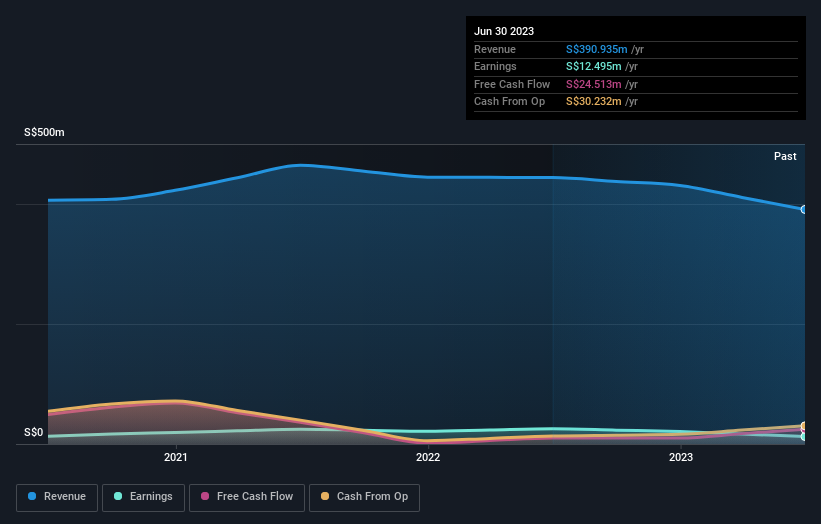YHI International Limited's (SGX:BPF) largest shareholders are private companies with 44% ownership, individual investors own 29%
Key Insights
Significant control over YHI International by private companies implies that the general public has more power to influence management and governance-related decisions
A total of 2 investors have a majority stake in the company with 60% ownership
To get a sense of who is truly in control of YHI International Limited (SGX:BPF), it is important to understand the ownership structure of the business. The group holding the most number of shares in the company, around 44% to be precise, is private companies. In other words, the group stands to gain the most (or lose the most) from their investment into the company.
Individual investors, on the other hand, account for 29% of the company's stockholders.
Let's delve deeper into each type of owner of YHI International, beginning with the chart below.
View our latest analysis for YHI International
What Does The Lack Of Institutional Ownership Tell Us About YHI International?
We don't tend to see institutional investors holding stock of companies that are very risky, thinly traded, or very small. Though we do sometimes see large companies without institutions on the register, it's not particularly common.
There are multiple explanations for why institutions don't own a stock. The most common is that the company is too small relative to funds under management, so the institution does not bother to look closely at the company. On the other hand, it's always possible that professional investors are avoiding a company because they don't think it's the best place for their money. YHI International's earnings and revenue track record (below) may not be compelling to institutional investors -- or they simply might not have looked at the business closely.
YHI International is not owned by hedge funds. Looking at our data, we can see that the largest shareholder is YHI Holdings Pte Ltd. with 44% of shares outstanding. For context, the second largest shareholder holds about 15% of the shares outstanding, followed by an ownership of 4.8% by the third-largest shareholder. Two of the top three shareholders happen to be Senior Key Executive and Chairman of the Board, respectively. That is, insiders feature higher up in the heirarchy of the company's top shareholders.
After doing some more digging, we found that the top 2 shareholders collectively control more than half of the company's shares, implying that they have considerable power to influence the company's decisions.
Researching institutional ownership is a good way to gauge and filter a stock's expected performance. The same can be achieved by studying analyst sentiments. As far as we can tell there isn't analyst coverage of the company, so it is probably flying under the radar.
Insider Ownership Of YHI International
The definition of company insiders can be subjective and does vary between jurisdictions. Our data reflects individual insiders, capturing board members at the very least. Management ultimately answers to the board. However, it is not uncommon for managers to be executive board members, especially if they are a founder or the CEO.
Most consider insider ownership a positive because it can indicate the board is well aligned with other shareholders. However, on some occasions too much power is concentrated within this group.
Our most recent data indicates that insiders own a reasonable proportion of YHI International Limited. Insiders own S$36m worth of shares in the S$138m company. It is great to see insiders so invested in the business. It might be worth checking if those insiders have been buying recently.
General Public Ownership
The general public-- including retail investors -- own 29% stake in the company, and hence can't easily be ignored. While this size of ownership may not be enough to sway a policy decision in their favour, they can still make a collective impact on company policies.
Private Company Ownership
It seems that Private Companies own 44%, of the YHI International stock. It might be worth looking deeper into this. If related parties, such as insiders, have an interest in one of these private companies, that should be disclosed in the annual report. Private companies may also have a strategic interest in the company.
Next Steps:
It's always worth thinking about the different groups who own shares in a company. But to understand YHI International better, we need to consider many other factors. For instance, we've identified 3 warning signs for YHI International (1 is concerning) that you should be aware of.
If you would prefer check out another company -- one with potentially superior financials -- then do not miss this free list of interesting companies, backed by strong financial data.
NB: Figures in this article are calculated using data from the last twelve months, which refer to the 12-month period ending on the last date of the month the financial statement is dated. This may not be consistent with full year annual report figures.
Have feedback on this article? Concerned about the content? Get in touch with us directly. Alternatively, email editorial-team (at) simplywallst.com.
This article by Simply Wall St is general in nature. We provide commentary based on historical data and analyst forecasts only using an unbiased methodology and our articles are not intended to be financial advice. It does not constitute a recommendation to buy or sell any stock, and does not take account of your objectives, or your financial situation. We aim to bring you long-term focused analysis driven by fundamental data. Note that our analysis may not factor in the latest price-sensitive company announcements or qualitative material. Simply Wall St has no position in any stocks mentioned.


